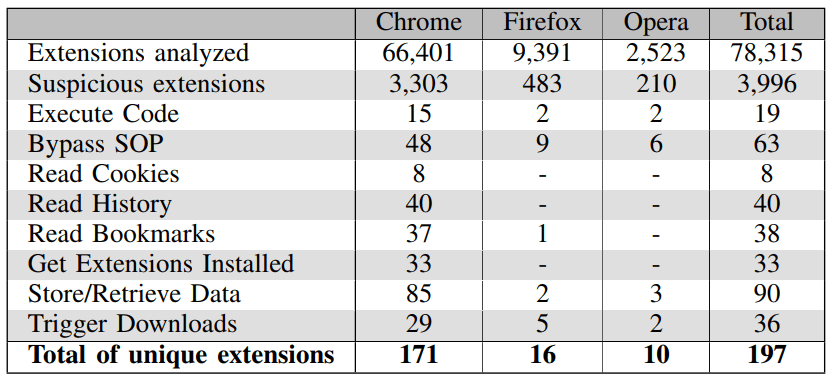Researchers have added another reason to be suspicious of web browser extensions. According to a recently published academic report, various Chrome, Firefox and Opera browser extensions can be compromised by an adversary that can steal sensitive browser data and plant arbitrary files on targeted systems.
“We identified a good number of extensions that can be exploited by web applications to benefit from their privileged capabilities,” wrote Université Côte d’Azur researcher Dolière Francis Somé, in an academic paper titled Empowering Web Applications with Browser Extensions (PDF).
A web application is a client-server computer program that a computing device runs in a web browser – such as an online form or browser-based word processor. That’s separate from a browser extension – a small software add-on for customizing a web browser with something like an ad-blocker or a web-clipping tool.
“[Browser extensions] have access to sensitive user information, including browsing history, bookmarks, credentials (cookies) and list of installed extensions,” Somé pointed out. “They have access to a permanent storage in which they can store data as long as they are installed in the user’s browser. They can trigger the download of arbitrary files and save them on the user’s device.”
That access is unique to web applications, which are subject to what are called a Same Origin Policy (SOP) that bars an app from reading and writing user data between domains. The research, however, demonstrates how a specially crafted web application can bypass SOP protections by exploiting privileged browser extensions.
“Our results demonstrate that the communications between browser extensions and web applications pose serious security and privacy threats to browsers, web applications and more importantly to users,” according to the research.
The attack, according to researchers, would follow this example:
“An attacker [uses] a script that is present in a web application currently running in the user browser. The script either belongs to the web application or to a third party. The goal of the attacker is to interact with installed extensions, in order to access user sensitive information. It relies on extensions whose privileged capabilities can be exploited via an exchange of messages with scripts in the web application,” researchers wrote.
They added, “Even though content scripts, background pages and web applications run in separate execution contexts, they can establish communication channels to exchange messages with one another… APIs [are used] for sending and receiving (listening for) messages between the content scripts, background pages and web applications.”
Somé focused on a specific class of web extension called “WebExtensions API,” a cross-browser extensions system compatible with major browsers including Chrome, Firefox, Opera and Microsoft Edge. After analyzing 78,315 extensions that used the specific WebExtension API, it found 3,996 that were suspicious. (see chart below)
While it seems voluminous, Somé noted that research found a small number of vulnerable extensions overall, and that concern should be measured. However, “browser vendors need to review extensions more rigorously, in particular take into consideration the use of message passing interfaces in extensions.”











